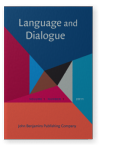Vol. 1:1 (2011) ► pp.79–104
Dialogicality and ethics
Four cases of literary address
Now that linguists are beginning to see an element of dialogicality in all language use, there is more scope for a humanized dialogue analysis with ameliorative goals. This can divide its labour between a communicational criticism dealing with the ethics of address, and a mediating criticism dealing with the ethics of response. In the present article, I outline the distinctive features of such an approach, and by sketching a communicational theory of literature (cf. Sell 2000) draw particular attention to the dialogicality arising between literary writers and their audience. From this starting-point, I then examine instances of four different literary genres for the light they can throw on the general ethics of address. Key terms here are “genuine communication”, by which I mean any manner of communication which respects the autonomy of the human other, and “negative capability”, defined by Keats (1954 [1817]: 53) as the capability of “being in uncertainties, Mysteries, doubts, without any irritable reaching after fact and reason”.
Cited by (5)
Cited by 5 other publications
This list is based on CrossRef data as of 5 july 2024. Please note that it may not be complete. Sources presented here have been supplied by the respective publishers. Any errors therein should be reported to them.
